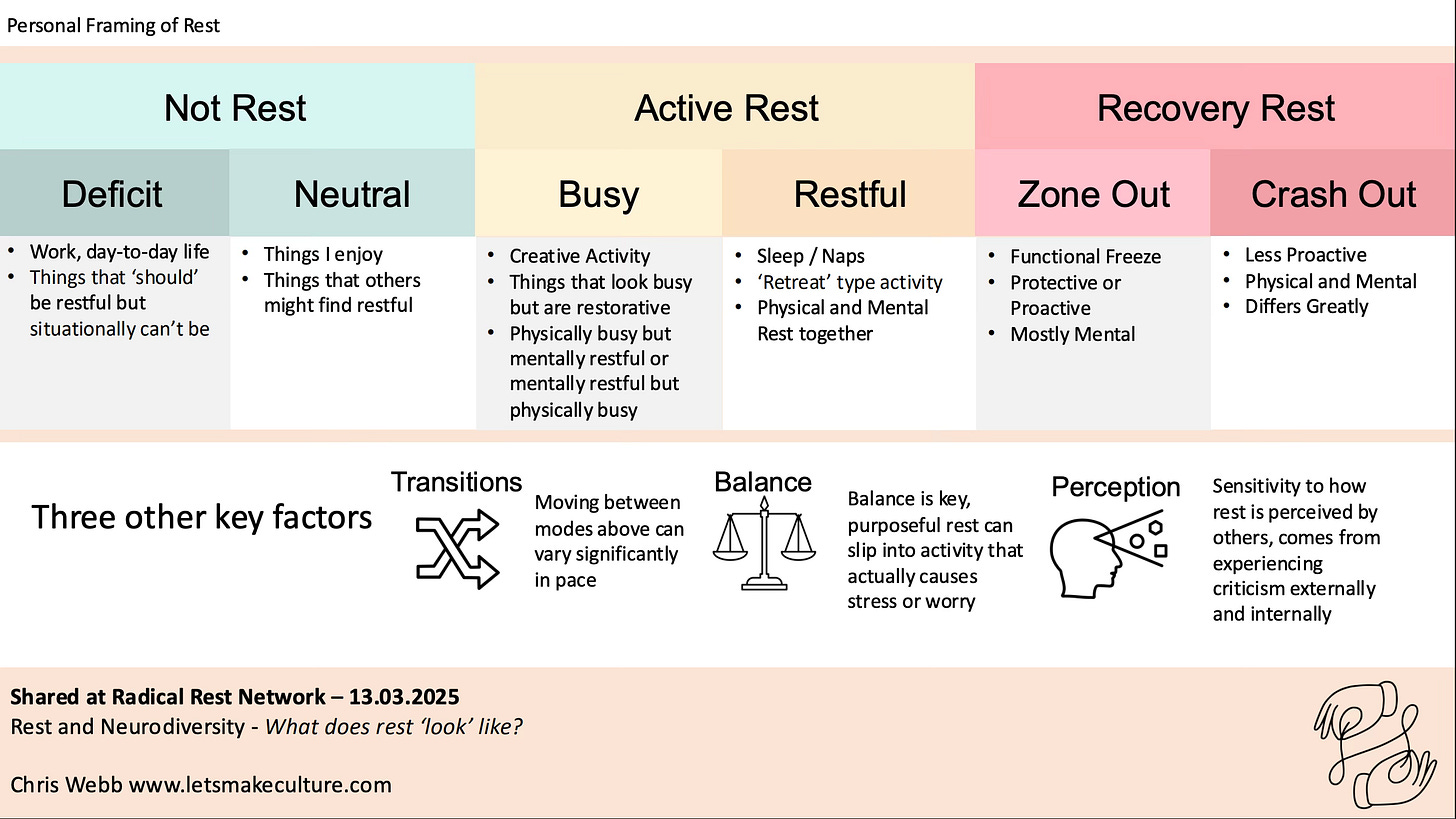Happy Spring, Radical Rest Network! In this month’s mailout we have a much-requested meet-up on burnout, what rest ‘looks like’ for neurodivergent and neurotypical people, and recommended resources from members.
If you’re new to the Radical Rest Network, you can find our favourite resources on this pinned post:
Next online meet-up: Anti-burnout
Join our next online meet-up on Thursday 1st May, 2-3pm (BST) with wonderful speaker Laura Crossley, who’ll give insight from her recent research on experiences of burnout in the cultural sector, and what can prevent it. Enjoy this plus discussion with other Radical Rest Network members and, of course, a collective chance to rest.
Joining us? RSVP here: https://forms.gle/AcEJcttrrDPeKcRy8
What rest ‘looks like’
We had the brilliant Chris Webb speak at our March meet-up, framing what rest can look like from a neurodivergent perspective. Here’s some highlights and resources if you missed it:
Activities can be split into Not Rest (e.g. take a deficit of energy), Active Rest (whether physically busy or still), and Recovery Rest (for protection or crashing out) - related to the Zones of Regulation.
Noticing these differences, you can use tools to manage them e.g. talk out loud during a ‘neutral’ activity so it’s not taking a ‘deficit’ of energy to stay focused.
Metaphors can be helpful: energy as a bucket with a hole, know what fills it up and doesn’t overflow.
Calm training for a dog involves teaching them that ‘doing nothing’ is doing something - give yourself permission to properly relax!
Learn from the strategies of neurodivergent people, useful for everyone.
Discussion with members:
Anticipating and planning the need for rest before you ‘crash out’ - choose to rest before your body makes you. “The mind speaks to you with emotions, and shouts at you with physical symptoms”
Importance of listening to yourself: body and mind can be disconnected in ADHD (e.g. don’t realise you’re hungry until you’re starving) - use exercises to attune.
Breaks for the toilet/tea aren’t the same as rest.
Tips on how to ‘switch off’: e.g. writing out thoughts, doing a little task - be aware of what you need for this transition.
5 minutes’ rest is achievable and so powerful - you don’t need to finish everything before you can rest!
Useful links from Chris:
Metaphors & resources for understanding neurodivergence:
Wellbeing and Neurodiversity resources:
Goodwill Talks: Chris offers an hour a week as a free no-strings reflective space for people emerging in their careers or facing barriers in the sector. He’d be very happy for anyone to book a time to chat about rest!
Your ideas for Radical Rest
Do you have an idea for a future speaker on “rest as a parent”, or “rest as a freelancer”? A topic you’d like for a future meet-up? A source of funding we should look at, to be able to do more with Radical Rest?
Click the button to tell us, or email radicalrestkate@gmail.com
Recommended reads this month:
Random Episodic Silent Thinking (REST): from staring out of the window to drifting in a boat, how creative people carve out time for “free-floating periods of thought.”
Book recommendation: Slow Productivity “Our current definition of ‘productivity’ is broken. It pushes us to treat busyness as a proxy for useful effort, leading to impossibly lengthy task lists and ceaseless meetings…”
Learn from this writer’s experience of ‘Living Danishly’ for a decade, including enjoying hygge and the Scandinavian 33-hour week


